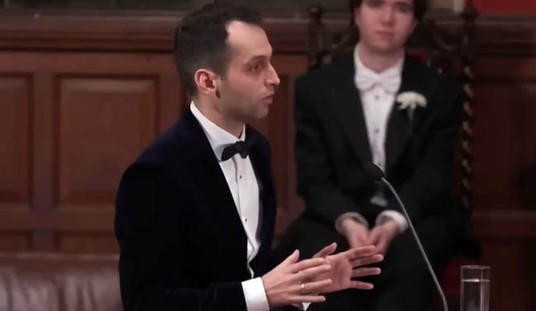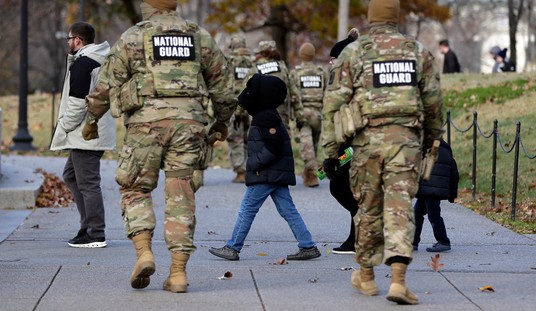Funny, most voters thought we had that debate in 2007 and 2008, when Barack Obama railed at the Bush administration’s policies of surveillance and warrantless wiretapping. Five years later, we not only find out that Obama didn’t end those policies, but he amplified them — especially in content surveillance through the “exponential” expansion of PRISM. Suddenly, now that he’s been exposed as no different and probably worse than the man he replaced on surveillance, the President wants to have a “debate” again, but Josh Gerstein points out both the hypocrisy and the lack of any hope of credibility from the White House:
The Obama administration has a familiar refrain on the surveillance of Americans’ telephone records: the president and his team are eager to have the debate.
Eager, that is, only after others have brought the tactics to light and the administration has spent years employing them.
On Guantanamo and drone strikes, as well as his administration’s aggressive use of leak investigations into the telephone records and e-mails of journalists, President Barack Obama and his aides often seem to cast him as a detached analyst or law professor watching policies carried out, rather than the one actually directing or responsible for them.
Gerstein points out the obvious about the timing:
Only after the leak Wednesday of a four-page “top secret” court order indicating that millions of Americans’ phone calls were tracked on a daily basis did officials begin to confirm the program’s details.
But Obama could have chosen at any time to disclose the data-sifting program, or even its rough outlines. That fact leaves critics unimpressed with his latest round of let’s-talk-it-over.
It reminds one of Eric Holder’s “creeping sense of remorse” over having approved the warrant on James Rosen naming him a co-conspirator in espionage. That “creeping sense of remorse” had the same triggering event as Obama’s sudden desire to have a “debate” on surveillance: getting caught. Both offerings of repentance, by the way, didn’t come from the men involved but nameless aides, too.
The debate is coming whether Obama wants it or not. Also at Politico, the President may find himself with fewer allies this time around, too:
In the last few weeks, some of the loudest anti-Bush voices — including Democratic Reps. Henry Waxman and Ed Markey and Sens. Mark Udall and Ron Wyden – have been demanding answers from the White House on civil liberties, privacy and regulations, some of the same questions that defined Bush’s second term. …
As Obama grapples with a slew of second-term scandals about the scope of government power — from the Justice Department snooping on reporters to the IRS hassling tea partiers — it’s a bad time to be short on friends.
“The president said that I must return to my authentic self. And I think the president needs to go back and read his own speeches,” said Rep. Elijah Cummings, implying Obama could use a refresher course on some of his own 2008 campaign rhetoric — when he spoke openly about not becoming part of the conventional politics of Washington.
Others likened him to Bush, directly.
“I’m very concerned that this is basically a continuation of the policies of the Bush administration and the abuses of the Patriot Act. I’d like to see better out of this administration,” said Rep. Peter DeFazio, an Oregon Democrat who noted he’s long been game to question Obama’s priorities.
Bloomberg News’ editorial board isn’t likening Obama to George W. Bush. They’re calling him “Orwellian,” and that was before they knew about PRISM:
On May 23, President Barack Obama gave a major speech on terrorism that was intended to signal the end of an era. In his remarks at the National Defense University, Obama said the terrorist threat against the U.S. had “shifted and evolved” since the Sept. 11 attacks. It was time, he said, to ask “hard questions” about how the U.S. should adapt to new realities.
Curiously, we now learn that just one month before his speech, the Obama administration responded to new realities with the same old habits. On April 25, administration officials sought court permission under the Foreign Intelligence Surveillance Act to begin collecting telephone records of millions of U.S. customers of Verizon Business Network Services, a Verizon Communications Inc. (VZ) subsidiary. A compliant national security court — there appears to have been no other type since Sept. 11 — authorized the collection, allowing it to continue until July 19. The order isn’t scheduled to be declassified until 2038. …
If Obama wants on one hand to move the U.S. beyond an era of overreaction, and on the other to secure legitimacy for national security investigations, the government is going to have to trust its citizens a little more. We need to know what the grounds are for these continuing surveillance requests and how they could be so sweeping as to encompass millions of Verizon customers nationwide.
Here’s another question Bloomberg’s editors would like to debate:
Are we living in a police state? We’d like to know.
Obama does have one editorial board on his side — the New York Times, which watered down its previously scathing editorial on the phone-records trawl without acknowledging the edit:
The New York Times editorial board has quietly changed the language in the most widely cited line from Thursday’s scathing editorial about the Obama administration’s surveillance of U.S. citizens.
The line — “The administration has now lost all credibility” — was changed Thursday night to read, “The administration has now lost all credibility on this issue.” No correction or explanatory note was appended.
“The change was for clarity’s sake,” Andrew Rosenthal, the Times editorial page editor, told POLITICO on Friday morning. “It was clear from the context of the editorial that the issue of credibility related to this subject and the final edit of the piece strengthened that point.”
Weakness is strength! That has a familiar sound to it, no?
Nick Gillespie wants in on the debate, too. He deconstructs the emerging apologias for the Obama Surveillance State, which should be read in full, but here’s an excellent point on the difference between voluntary disclosures in private transactions and involuntary disclosures forced by the government:
Second, blur the distinction between voluntary disclosures of your information and government surveillance. Also at Slate (hmm…the same outfit whose staff voted overwhelmingly for Obama), Amy Webb says chill because “You’re sharing your private data with corporations and governments all the time.” What’s the fuss, she argues, “By definition, you’re surrendering your privacy by using your phone.” Really? There’s no meaningful distinction to be drawn between, I don’t know, checking in on Four Square (if anyone still does that) or making a phone call and the government routinely collecting millions of phone records? Especially under the pretense that this is done to keep tabs on foreign agents and non-citizens who may be looking to blow us up? The F in FISA stands for foreign, not domestic. Facebook, Twitter, the NSA – it’s all the same, isn’t it? They all have equal power to declare you an enemy combatant and throw you in prison, after all. (For a primer on some very basic distinctions between data gathering between public and private sources, read Reason’s classic 2004 cover story, “Database Nation: The upside of ‘zero privacy,'” by Declan McCullagh.)
Yes, let’s have this debate … and keep in mind the credibility of Barack Obama, James Clapper, Eric Holder, and everyone else likely to weigh in on it from the Obama administration while having it.









Join the conversation as a VIP Member